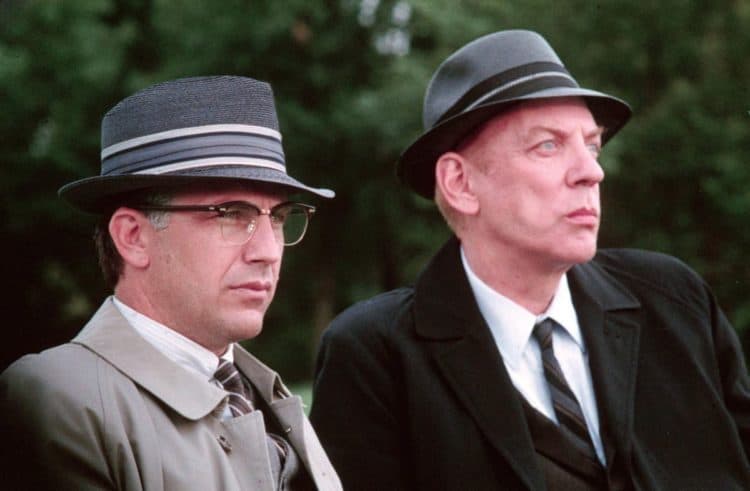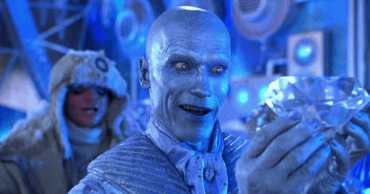
Oliver Stone is a filmmaker that has consistently explored recent American history and culture through an analytical lens that offers a thought-provoking take on established points-of-view. With stellar films like Platoon (1986), Wall Street (1987), and Natural Born Killers (1994), Stone’s approach to examining sensitive and repellent subjects has always been an example of Postmodern filmmaking that hits close to home. Perhaps his most controversial films that reflect reality are his takes on the modern presidency, which can be found in JFK (1991), Nixon (1995), and W. (2008). JFK takes a sprawling and rapid-fire look at the JFK assassination, whereas Nixon and W. are warts and all biopics. Each of these films has their fair share of detractors in addition to those who still praise them to this day. Although each film is structurally different, all three are represented by superior performances, innovative cinematography and film editing, as well as controversial, yet incredibly intriguing narratives that seek to expose the great flaws in real events that are cloaked in establishment narratives that deter a deeper analysis or countering point-of-view. Stone’s approach is bold and uncompromising, and you can rest assured that his portraits of the recent American presidency are not sycophantic or wrapped in patriotic brainwash.
JFK (1991)
Upon it’s release in 1991, JFK was an immediate firebrand for controversy. Although even it’s detractors praised it’s technical merits, the film’s themes challenged the status quo, and brought for compelling revelations around the 35th president’s assassination that caused discomfort to those who wholeheartedly believed the established narrative. For every truth, there is a kernel of exaggeration behind it, and when it comes to the slaying of a beloved president, there have long been suggestions that there is more to the story than meets the eye. The JFK assassination on November 22, 1963 brought the nation to a standstill, and Lee Harvey Oswald was quickly established as the villain that snuffed out the life of a young leader that had captivated the world. I don’t agree with all of Stone’s suggestions–namely the notion that JFK was a progressive firebrand; at the least, he certainly wasn’t blemish-free, but Stone’s arguments and revelations as seen through the eyes of Orleans Parish, Louisiana DA Jim Garrison (Kevin Costner), are so well presented that even the most ardent detractor must pause to ponder. The thing about conspiracy theories is that the theories will never do anything to move the needle forward: some are ridiculous (The Queen of Great Britain ordered MI6 to kill Diana, Princess of Wales) and yet others deserve a deep dive, and the slippery slope of the many unorthodox circumstances surround JFK’s assassination is certainly one of them. The divide will always be split down the middle, and all it takes is smear campaigns to muddy the waters. The most controversial aspects of the film include Stone’s suggestion that both Lee Harvey Oswald and Jack Ruby knew one another, as well as several characters representing real people that changed their stories and recanted various confessions so many times it becomes a stretch to suggest that this highlights an intergovernmental conspiracy to kill the president. No matter the take away from Stone’s observations and suggestions, the film is a marvel of cinematic achievement; films are not about recreating historical truths–they are about moving and intriguing an audience. If you want complete accuracy and objectivity then watch a documentary or read a book.
Nixon (1995)
Four years after JFK’s release, Stone decided to make a film that plays as a mostly consistent biopic of President Richard Nixon–one of the most controversial and in many ways tragic, of all American presidents. Again, it is important not to immediately take a film like Nixon as pure fact; that is not the point, and Stone’s artistry is to capture the essence of the man and his many trials and tribulations. For me, this film is the crowning achievement of Stone’s films on the American presidency, and nearly all of that has to do with Anthony Hopkins’ towering performance in the title role. At the time, much like with today’s biopics, critics complained that Hopkins neither looked nor sounded like Nixon. Some accuracy towards the real person is needed, but when it comes to cinema, it’s the mental taking on of the person that is most important, and this is the best performance of an American president ever. It is up for debate if Nixon was an alcoholic, if his childhood was really so tragic that it haunted him throughout adulthood, if he conspired to have Fidel Castro assassinated and knew of a possible threat towards President Kennedy. Like JFK, this is Oliver Stone’s way of presenting food for thought, and despite the necessity of trying to unravel if what we are seeing and hearing is 100% accurate, the facts that exist in the public record describing Nixon’s downfall are close to the cause for Stone’s unflattering, yet honest presentation here.
W. (2008)
If you are noticing a pattern here of critiques towards Stone’s alternative approach to history, then you can expect that is also on display in W., Stone’s third and final film on U.S. presidents this time depicting the early life and first term of George W. Bush in the early 2000s. The thing about Bush, the nation’s 43rd president, is that so much of what Stone depicts is well-known within the public record. Bush’s cooking up of the invasion and subsequent war with Iraq is an example of a president making questionable moves right out in the open. The film is unflattering, but Stone presents the fumbling around of Bush’s life as matter-of-fact and direct–not necessarily sinister or pure caricature. Josh Brolin plays Bush 43 in a mirroring of reality, and if he presents some of Bush’s cabinet as sinister, it’s not hard to find fault with this due to this administration adding validity to their aims and goals in the open. Not as great as the first two films, but W. is an important film depicting a wildly consequential and chaotic time in recent history.
 Follow Us
Follow Us





